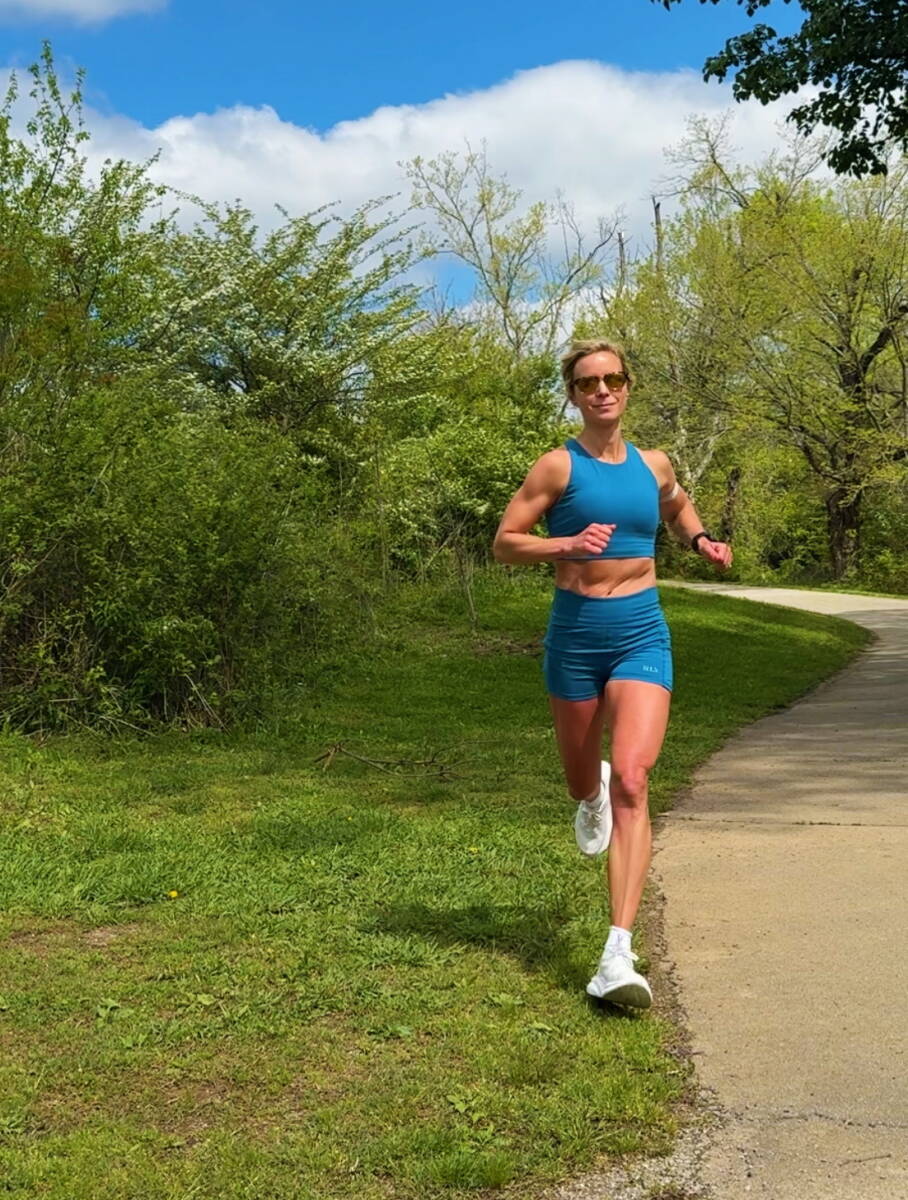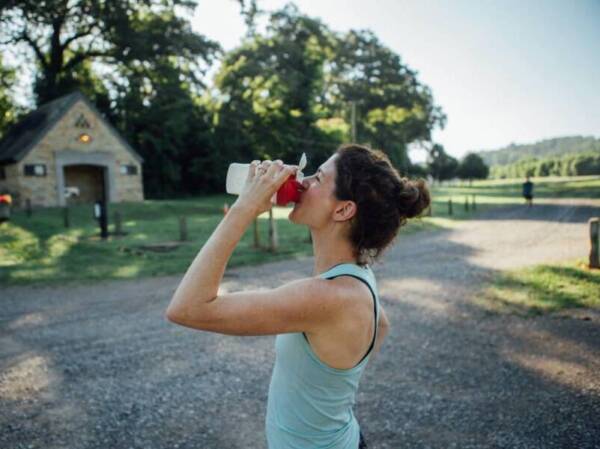Everything Runners Need to Know About Collagen
Should runners take collagen? And if so, what type of runners and why type of collagen? That’s what I set out to answer because honestly supplements are confusing, and the supplement industry is an unregulated mess.
My sister started asking me all these questions about what supplements she needed to take as an over-forty female including: was taking collagen peptides the same as taking protein? (No.)

I wanted to help so I got with the experts as I couldn’t answer all her questions.
Personally, I take collagen and have noticed a big difference in how my body feels recovering from running. But it was the type of collagen and the consistency of it that was the difference maker. Before I would take the Vital Proteins collagen peptides after every hard workout—so a couple of times a week. That made zero difference. When I switched collagen brands and took it every day (starting with 60 days of a double dose, then tapering off to a single dose) I noticed my joints didn’t feel stiff. Oh, and my nails were thicker than they have ever been, and my skin looked more youthful.
Table of contents
- Why would runners need to supplement with collagen?
- Why is collagen supplementation extra important for runners?
- What type of runners should take collagen?
- When should I take collagen?
- What should runners look for in their collagen supplement?
- What are the best collagen supplements on the market?
- FAQs about Collagen
- What is collagen?
- What does collagen do?
Taking collagen as a master’s runner has played an important role in being healthy—but should every runner take collagen? I got with Mandy Kimple, a nurse practitioner trained specifically in collagen supplementation, and Megan Robinson, a registered sports dietitian for their take.
I am sharing everything runners need to know about collagen with what is basically your collagen cheat sheet for runners. Let’s go!
Why would runners need to supplement with collagen?
You may be thinking—if collagen is naturally found in the body, why would a runner need to supplement collagen? There are several reasons including that our body’s collagen production declines after we turn 25. 25!
By age 40 we are losing 1% of our collagen per year; faster with stress, sun exposure, hormonal shifts (estrogen decline and menopause) and poor nutrition, explains Kimple. And, athletes, especially runners, are at higher risk for collagen breakdown due to repetitive impact and mechanical stress.
Age is just one-factor affecting collagen breakdown. The causes of collagen breakdown include.
- Aging: natural decline in production
- Chronic inflammation: increases the enzymatic breakdown of collagen
- UV radiation, smoking, poor sleep, stress, nutrient deficiencies (specifically vitamin C, zinc and glycine)
- High impact, repetitive stress: running, especially long distances or on hard surfaces, increases joint and tendon wear and tear.
Why is collagen supplementation extra important for runners?
Kimple breaks it down for us:
- Running involves repetitive joint loading–ankles, knees, hips and spine
- Cartilage is avascular and very slow to heal so protecting it is essential
- Many runners deal with joint pain, tendonitis, stress fractures, and early arthritis
- Collagen supports tissue repair, recovery, and resilience to injury
- Preventative care is key! Support your joints before pain or degeneration starts.
What type of runners should take collagen?
So, if you are a runner and over the age of 25—do you need to take collagen? Not necessarily. According to Robinson, some specific runners would benefit from collagen supplementation either as a preventative measure against degeneration or as a way to support tissue repair. (Robinson emphasizes that trying to get your nutrients from food is always best! But sometimes supplementation is helpful.)
The types of runners who may benefit from taking collagen include:
- Masters runners (those over 40)
- Injured runners or runners recovering from injury
- Runners with arthritis, or
- Runners with a history of tendon injuries.
Is there harm in supplementing with collagen if you don’t need it?
The biggest harm in supplementing with collagen is to your wallet. If you don’t want to shell out for an expensive collagen supplement, you can get it eating Knox brand gelatine which is tasteless and there are recipes like this one where you can combine the jello with orange juice as a vitamin C source. But you would have to eat it daily for the effects–plus studies show collagen in gelatine isn’t as easily absorbed and used by the body (more on this below). It also isn’t paired with hyaluronic acid (HA) and chondroitin which are beneficial for joints and in many joint supplements (more on that below).
Some other harms of supplementing with collagen include the potential for GI distress, and if you are using bad-quality collagen, there is a risk of heavy metals (see more below about Vital Proteins).
When should I take collagen?
Timing and sourcing are key for collagen supplementation. Runners supplementing with collagen should remember 3 things: consistency, pre-run, and vitamin C:
- Collagen should be taken every day and can take up to six months to fully feel (and see!) effects, shares Robinson.
- Specifically, Robinson and Kimple recommend taking it 30-60 minutes before running or strength training to enhance collagen synthesis in response to mechanical stress.
- Also note, taking collagen with vitamin C is essential for collagen formation. A half a glass of orange juice (4 ounces) will do if it is not included in your supplement.
Why should you take collagen before working out not after? Robinson explains: “Collagen is best for joint and tendon health and can only provide about 2-4% for muscle protein synthesis muscle protein synthesis, unlike whey protein (containing leucine) which is best for muscle protein synthesis. “That is why taking it around exercise is beneficial but not a replacement for eating enough protein post-workout to rebuild and repair muscle tissue.”
What should runners look for in their collagen supplement?
There are many types of collagen, and what type you take matters—along with what else is in the supplement. Before you read the specifics, here is your primer: think liquid, chicken, and type II. Ok, here’s what to look for in a collagen supplement, according to Kimple:
- Type II collagen. Most powders contain type I and III collagen which support skin, hair, and tendons but not cartilage. Type II collagen is found in articular cartilage, the tissue most stressed in running, which specifically mirrors the structure of articular collagen.
- Clinical studies validation. Read the fine print: Look for clinical trials on the site that show the supplement reduces joint pain and improves function.
- Bio-optimized. Look for the word “bio-optimized” for the collagen. Bio-optimized has been shown in clinical trials to stimulate the body’s production of types I, II, and III collagen–supporting not just joints, but also tendons, ligaments, bones, and skin. (Types I and III also help support tendons, ligaments, bones, and skin. These work synergistically with type II collagen.)
- Hydrolyzed. This is another word to look for. Hydrolyzed means it is broken into smaller bits for better absorption. Kimple explains that the collagen molecule naturally is huge, making absorption difficult. Hydrolyzation makes it easier for our bodies to absorb and use.
- Liquid. Hydrolyzed liquid collagen is much easier absorbed than hydrolyzed powder. Liquids have a lower molecular weight, which ensures better absorption and delivery to tissues like cartilage.
- Hyaluronic acid (HA). HA is a key component of synovial fluid, which lubricates joints and reduces friction during movement. It’s also key for collagen synthesis so a decrease in HA means a decrease in collagen. Inadequate HA = cartilage wears down faster = stiffness and pain
- Chondroitin sulfate. This is essential for joint hydration and cushioning. It helps reduce cartilage degradation from repetitive impact.
- Single-source collagen (poultry/chicken). Poultry-derived collagen is the best as it is closest to human collagen. Collagen from marine, bovine, or porcine sources is often derived from ground-up hooves, hives, eyes, tails, hoofs, lips, and snouts. Contamination is a real concern here, notes Kimple. Single-source is extremely important. Collagens with multiple sources is essentially “a hot dog” collagen. Note: there is no such thing as a vegan collagen source.
- Vitamin C. This is a bonus ingredient. Some collagen supplements will have vitamin C to help with collagen formation. You can see this often in fruit juice extract ingredients.
What are the best collagen supplements on the market?
My collagen supplement (Modere Liquid BioCell) just went off the market so I am now on the lookout for the best collagen supplements. Here is a list of the very best you can buy:
- Modere Life Liquid Biocell – This is the collagen I take and Kimple strongly believes it is the best on the market. It is derived from poultry, easily absorbed, paired with Vitamin C, and very effective. It is temporarily off the market as Modere suddenly closed in April but you can still find it on third-party sellers. Efforts are underway from another company to use the formula so stay tuned. $139
- PURE Encapsulation Collagen – Until a version of the Modere Liquid Biocell is back on the market, Kimple is recommending runners use this other biocell option which comes with HA and chondroitin sulfate. It is a pill form so not as easily absorbed, however. Like the Modere, it is poultry-derived collagen. $44.40
What’s wrong with Vital Proteins collagen?
Well, you probably noticed that the most popular collagen supplement, Vital Proteins, is not on the list. Why? Kimple says these collagen peptides are ineffective and come with risks.
“The effectiveness of most collagen products readily on the market has not been validated in clinical studies,” she explains. ” Also, supplements, especially powders, are at risk for impurities and inconsistencies.”
Vital Proteins, in particular, has been sued numerous times for knowingly having lead, arsenic, and cadmium in their collagen. This is a widespread issue throughout the collagen and protein powder market due to sourcing. Many companies source from huge factory farms where there is heavy metal exposure to the animals, says Kimple. This is one big reason why she warns women, especially those who are trying to become pregnant, pregnant, or breastfeeding, to stay away from collagen peptide powders.
FAQs about Collagen
Why can’t I just eat collagen?
This is a great question–as most RDs want you to get your nutrients from food. But collagen is a bit more complicated. First of all, the big molecule makes it hard for us to absorb unless it is hydrolyzed. Also, the foods that contain collagen aren’t something most would want to eat every day such as bone broth, chicken skin, pork rinds, and tendons.
Furthermore, you want to take collagen with HA and chondroitin sulfate. To get those in your diet, you would need to eat bone broth, chicken skin, and organ meats for HA; and cartilage-heavy cuts of meat like pig ears and oxtail for the chondroitin sulfate. I think I just lost my appetite…
What is collagen?
According to Kimple, collagen is the most abundant protein in the human body. It is a structural protein that provides strength, elasticity, and resilience to connective tissues such as tendons, ligaments, cartilage, bones, and skin.
There are many types of collagen but the primary ones related to musculoskeletal health are:
- Type I: found in skin, tendons, ligaments and bones
- Type II: found in cartilage (especially articular cartilage in joints)
- Type III: found in skin, blood vessels, and organs (typically alongside type I)
Is collagen the same as protein?
Taking collagen is not the same as taking protein. While collagen is great for connective tissue repair, it’s not for muscle growth and maintenance.
That’s because, unlike protein, collagen does not have the complete essential amino acid profile critical for muscle building and repair. It lacks tryptophan, which is essential for muscle building and recovery, and doesn’t have enough leucine which triggers muscle protein synthesis. It also has low bioavailability (aka poor absorption), so it is hard to really “get it” in most supplements.
What does collagen do?
Collagen is crucial for joint health (especially articular cartilage in knees, hips and ankles); tendon and ligament strength and repair; bone density and resilience, skin elasticity and hydration (bonus for endurance athletes training outdoors in the elements); and gut lining integrity (important for nutrient absorption and recovery of runners), says Kimple.
Have you consistently taken collagen? If so, did you notice a difference?






